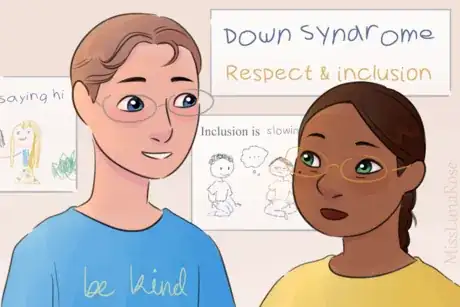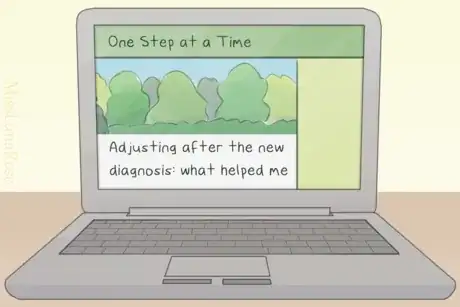This article was written by Luna Rose. Luna Rose is an autistic community member who specializes in writing and autism. She holds a degree in Informatics and has spoken at college events to improve understanding about disabilities. Luna Rose leads wikiHow's Autism Project.
There are 9 references cited in this article, which can be found at the bottom of the page.
This article has been viewed 13,335 times.
Autistic people can get a lot of negative feedback about their special interests. Sometimes, this ends in an autistic person feeling unsupported, or unable to share their interests. But that isn't right. The reality is that it is possible to have a good conversation about special interests.
Steps
Having a Conversation
-
1Try asking if it's a good time. This gives the person an opportunity to opt out of the conversation if they don't feel like having it right now. Sometimes, people have a lot on their mind or aren't in the right mood. Asking up front can help you know whether it's a good time to talk about what you love. For example:[1]
- "Is now a good time to tell you about the project I've been working on?"
- "I read something in the news about sea lions that I'm really excited about. May I tell you about it?"
- "I understand you're busy making supper now and want to be alone. Is there a better time that we could talk about it later?"
-
2Focus on reading your conversation partner, instead of obeying arbitrary "conversation rules." Sometimes, autistics are taught certain "rules" of conversation, which may feel strict or unfair (especially since others aren't expected to follow these rules). Instead of trying to memorize rules, work on noticing signs that your conversation partner is or isn't interested.
- For example, you may have been taught the 70/30 rule, which is that you must listen 70% of the time and only talk 30%. But sometimes, someone might really want you to infodump because they want to learn about the subject. In that case, the 70/30 rule isn't relevant.
Advertisement -
3Allow pauses and opportunities for your conversation partner to say what they think. Few people enjoy one-sided conversations (whether the speaker is autistic or not). But you can have two-sided conversations. Give time for them to ask questions or give their opinions. This can help direct the conversation towards areas you both want to discuss. [2]
- Nobody likes being interrupted. If you tend to interrupt people, teach yourself to slow down and say "I'm sorry. What were you saying?"
- Some people may be indirect and try to hint that they want to end the conversation or change the subject. This can be hard to pick up on, so just do your best to follow their lead.
-
4Notice signs that the person is interested in the conversation. Non-autistic body language may not be intuitive for autistic people, but there are signs you can pick up on if you pay attention. Sometimes, the listener may be really curious about what you're saying, and want you to keep explaining. Someone who is interested will generally...
- Ask questions from time to time
- Nod
- Make remarks like "Uh huh" or "Yeah?" to encourage you to continue
- Look at you (unless they're listening while doing a task like driving or chores)
- Face in your direction
- Share their thoughts and opinions on what you're saying
Keep in mind: While it's true that people can fake signs of interest, don't blame yourself for not noticing if someone does. They made the choice to feign interest. Some people do this because they care about you and they like making you happy. But if someone fakes interest and then gets mad at you for it, that's called "passive aggressive behavior" and it's not your fault for lacking magic mind-reading skills. This is their choice.
-
5Recognize the typical signs of disinterest. When people lose interest, they normally withdraw from the conversation and pay less attention. Also, some normal parts of autistic body language mean disinterest in non-autistic people, so it helps to be familiar with how they are different. Someone who isn't interested may...[3]
- Get very quiet
- Check the time a lot
- Try to change the subject
- Check their phone or get distracted
- Look at a door or other way out, because they want to leave
- Lean away, maybe turning their feet or body away
- Look around (if they're non-autistic)
- Fall asleep (if they're tired)
-
6Ask if you're unsure what someone's body language means. Most people will tell you how they feel if you ask, because they want to be understood. Try saying what you've observed in them (e.g. them spacing out), and then asking a question (like if they want to change the subject).
- "You're very quiet. Is something on your mind?"
- "I noticed that you're checking the time a lot. Do you need to leave for something?"
- "I get the sense that you're losing interest. Would you like to tell me about your day?"
- "I have a hard time reading people sometimes, so I need to ask. Are you still interested in talking about history, or do you want to change the subject?"
-
7Don't judge yourself if the person isn't interested, or loses interest. This doesn't mean that they don't like you, or that it is wrong for you to love your favorite subject as much as you do. You're still a good person and your interest is still amazing. It just wasn't the right time for that conversation with that person.
- Sometimes people are tired, or busy, or distracted and not able to be good listeners. That's okay. It's related to their state of mind, not how much they love you.
- Non-autistic people can't usually focus on one subject for as long as an autistic person can. This doesn't mean anything bad about them or you. It's just how their brain works.
Building Good Habits
-
1Give yourself time to learn and practice. As you navigate the complex world of socializing, you may make some social mistakes. That doesn't make you a failure, or a bad person. (Everyone makes social mistakes.) Be willing to forgive yourself and try again once you're ready.[4]
- Many of these skills aren't specific to autism. Some non-autistic people don't know how to do these things either. Being autistic doesn't make you automatically bad at conversations.
- Often, a social mistake can be fixed with a short apology, like "Sorry I interrupted you so much yesterday. I'm working on my impulse control. Feel free to ask me to slow down if I do it again."
-
2Stop sharing your interests with people who react badly. Not everyone shares your interests or is close enough to you to be willing to listen. And not everyone is a good listener. If someone is generally a bad listener, you may be happier if you stop expecting them to be a good one. Instead, don't share important things with them, and consider them a casual acquaintance (or person to tolerate) instead of a close friend.[5]
- Some people just don't care.
- Some people like talking to you, but don't feel comfortable with your special interest (e.g. a person with a phobia of medical procedures not wanting to hear about them).
- Some people are judgmental or rude, and are usually very bad conversation partners.
- Some people are verbally abusive, and will look for any reason to criticize you.
-
3Look for people who share your interests, in person or online. Life can be much more fun when you're able to share your interests with other people who enjoy them too.[6]
- A school club
- A hobby-related group
- A class about your interest
- An online forum about your interest
- An autistic space online where infodumps are welcome
-
4Try starting a blog about your favorite things. Blogging can be a wonderful way to infodump about your special interests, even when nobody is around right now. You can also make connections with people who share your interests online.
- If you're a child, you may need parental permission to start a blog. Be sure to understand internet safety, too. If you talk about being autistic, protect your privacy for the future.[7]
- If you don't like blogging, you can try writing or editing wikiHow articles about your special interest.
-
5Appreciate your interests, even when no one else is around to share them with you. Your interests are amazing whether other people notice or not. Don't be afraid to love it wholeheartedly on your own.[8]
-
6Look for several good friends who like talking to you. It's good to know several people who love your favorite subject too, or love you enough to talk about it even if they're only mildly interested. That way, if one of them is busy or tired, another person might be available and ready to talk.
References
- ↑ https://raisingchildren.net.au/autism/communicating-relationships/communicating/conversation-skills-for-teens-with-asd#conversation-skills-for-autistic-teenagers-step-by-step-nav-title
- ↑ https://raisingchildren.net.au/autism/communicating-relationships/communicating/conversation-skills-for-teens-with-asd#conversation-skills-for-autistic-teenagers-step-by-step-nav-title
- ↑ https://www.kidshealth.org/MedStarHealth/en/teens/making-friends.html?WT.ac=t-ra
- ↑ https://autismawarenesscentre.com/improving-communication-behavior/
- ↑ https://www.kidshealth.org/MedStarHealth/en/teens/autism-bullying.html?WT.ac=t-ra
- ↑ https://autismtherapies.com/2021/09/28/reframing-your-childs-intense-interests-as-a-strength/
- ↑ https://misslunarose.home.blog/2020/12/05/anonymity-online/
- ↑ https://www.spectrumnews.org/features/deep-dive/the-benefits-of-special-interests-in-autism/
- ↑ https://sparkforautism.org/discover_article/special-interests-in-autism/









































































Medical Disclaimer
The content of this article is not intended to be a substitute for professional medical advice, examination, diagnosis, or treatment. You should always contact your doctor or other qualified healthcare professional before starting, changing, or stopping any kind of health treatment.
Read More...